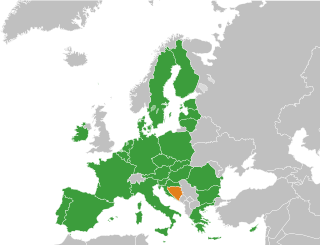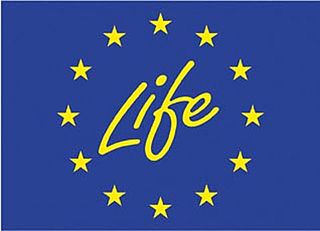
The Common Agricultural Policy (CAP) is the agricultural policy of the European Commission. It implements a system of agricultural subsidies and other programmes. It was introduced in 1962 and has since then undergone several changes to reduce the EEC budget cost and consider rural development in its aims. It has however, been criticised on the grounds of its cost, its environmental, and humanitarian effects.

The Directorate-General for European Civil Protection and Humanitarian Aid Operations, formerly known as the European Community Humanitarian Aid Office, is the European Commission's department for overseas humanitarian aid and for civil protection. It aims to save and preserve life, prevent and alleviate human suffering and safeguard the integrity and dignity of populations affected by natural disasters and man-made crises. Since September 2019, Janez Lenarčič is serving as Commissioner for Crisis Management in the Von der Leyen Commission, and since 1 March 2023, Maciej Popowski leads the organisation as the Director-General.

The European Structural and Investment Funds are financial tools governed by a common rulebook, set up to implement the regional policy of the European Union, as well as the structural policy pillars of the Common Agricultural Policy and the Common Fisheries Policy. They aim to reduce regional disparities in income, wealth and opportunities. Europe's poorer regions receive most of the support, but all European regions are eligible for funding under the policy's various funds and programmes. The current framework is set for a period of seven years, from 2021 to 2027.

The budget of the European Union is used to finance EU funding programmes and other expenditure at the European level.

Instrument for Structural Policies for Pre-Accession (ISPA) is one of the three financial instruments of the European Union to assist the candidate countries in the preparation for accession. It provides assistance for infrastructure projects in the EU priority fields of environment and transport.

The Directorate-General for International Partnerships is the European Commission department responsible for international development policy. It operates under the authority of the European Commissioner for International Partnerships, Jutta Urpilainen.

The accession of Bosnia and Herzegovina to the European Union (EU) is the stated aim of the present relations between the two entities. Bosnia and Herzegovina has been recognised by the European Union as a "candidate country" for accession since the decision of the European Council in 2022 and is on the current agenda for future enlargement of the EU. Bosnia and Herzegovina takes part in the Stabilisation and Association Process and trade relations are regulated by an Interim Agreement.
The Instrument for Pre-Accession Assistance, or simply IPA, is a funding mechanism of the European Union. As of 2007, it replaced previous programmes such as the PHARE, ISPA, SAPARD and CARDS. Unlike the previous assistance programs, IPA offers funds to both EU candidate countries and potential candidates.
European Union (EU) concepts, acronyms, and jargon are a terminology set that has developed as a form of shorthand, to quickly express a (formal) EU process, an (informal) institutional working practice, or an EU body, function or decision, and which is commonly understood among EU officials or external people who regularly deal with EU institutions.

The Treaty on the Functioning of the European Union (TFEU) is one of two treaties forming the constitutional basis of the European Union (EU), the other being the Treaty on European Union (TEU). It was previously known as the Treaty Establishing the European Community (TEC).

The LIFE programme is the European Union's funding instrument for the environment and climate action. The general objective of LIFE is to contribute to the implementation, updating and development of EU environmental and climate policy and legislation by co-financing projects with European added value. LIFE began in 1992 and to date there have been five phases of the programme. During this period, LIFE has co-financed some 4600 projects across the EU, with a total contribution of approximately 6.5 billion Euros to the protection of the environment and of climate. For the next phase of the programme (2021–2027) the European Commission proposed to raise the budget to 5.45 billion Euro.

Cross-border cooperation is the collaboration between adjacent areas across borders. In the European Union this is one of the forms of territorial cooperation. The European model is very diverse with cooperation between border regions or municipalities, or through specific cooperation structures. These structures are usually composed by public authorities from different countries organized in working communities, euroregions or EGTCs.

Within the framework of EU economic governance, Sixpack describes a set of European legislative measures to reform the Stability and Growth Pact and introduces greater macroeconomic surveillance, in response to the European debt crisis of 2009. These measures were bundled into a "six pack" of regulations, introduced in September 2010 in two versions respectively by the European Commission and a European Council task force. In March 2011, the ECOFIN council reached a preliminary agreement for the content of the Sixpack with the commission, and negotiations for endorsement by the European Parliament then started. Ultimately it entered into force 13 December 2011, after one year of preceding negotiations. The six regulations aim at strengthening the procedures to reduce public deficits and address macroeconomic imbalances.

The Treaties of the European Union are a set of international treaties between the European Union (EU) member states which sets out the EU's constitutional basis. They establish the various EU institutions together with their remit, procedures and objectives. The EU can only act within the competences granted to it through these treaties and amendment to the treaties requires the agreement and ratification of every single signatory.

The European Commission's Asylum, Migration and Integration Fund is a funding programme managed by the Directorate-General for Migration and Home Affairs which promotes the efficient management of migration flows and the implementation, strengthening and development of a common approach to asylum and immigration in the European Union. All EU Member States except Denmark participate in the implementation of this Fund. Most of the funds are provided to the EU Member States for activities addressing previously agreed upon themes. A part of the funding is reserved for emergency assistance. A final part is reserved for Union Actions, which are European Commission managed projects that are developed as either calls for proposals, direct awards, procurements, or delegation agreements.

Article 7 of the Treaty on European Union is a procedure in the treaties of the European Union (EU) to suspend certain rights from a member state. While rights can be suspended, there is no mechanism to expel a state from the union.
The migration and asylum policy of the European Union is within the area of freedom, security and justice, established to develop and harmonise principles and measures used by member countries of the European Union to regulate migration processes and to manage issues concerning asylum and refugee status in the European Union.

Next Generation EU (NGEU) is a European Commission economic recovery package to support the EU member states to recover from the COVID-19 pandemic, in particular those that have been particularly hard hit. It is sometimes styled NextGenerationEU and Next Gen EU, and also called the European Union Recovery Instrument. Agreed in principle by the European Council on 21 July 2020 and adopted on 14 December 2020, the instrument is worth €750 billion. NGEU will operate from 2021 to 2026, and will be tied to the regular 2021–2027 budget of the EU's Multiannual Financial Framework (MFF). The comprehensive NGEU and MFF packages are projected to reach €1824.3 billion.
This is a timeline of the relations between Hungary and the European Union (EU), since the transition in Hungary in 1989-90.
The EU's Support to mitigate Unemployment Risks in an Emergency instrument is a temporary support for mitigating the risks of unemployment in emergency situations. It was created in April 2020 to help protect jobs and workers affected by the COVID-19 epidemic.







